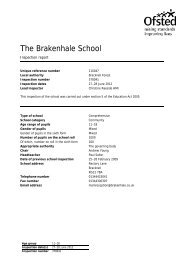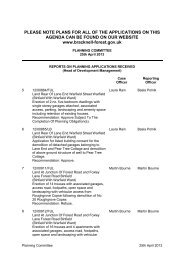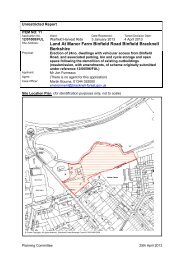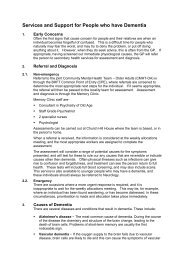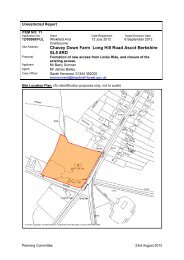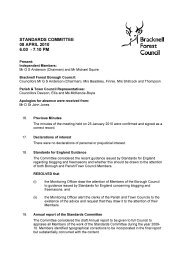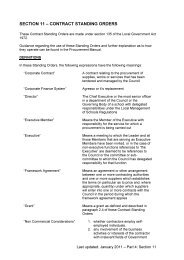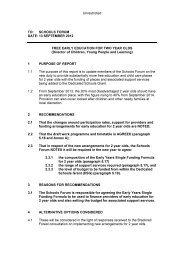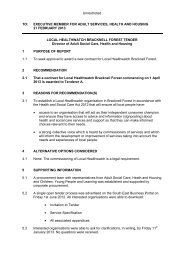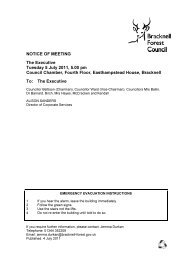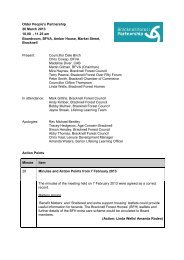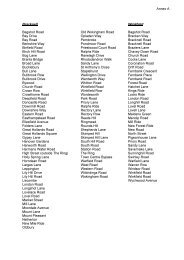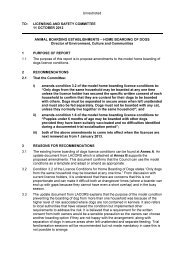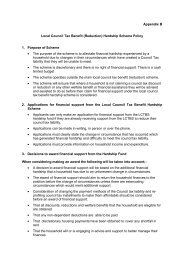children, young people & learning overview & scrutiny panel 12 ...
children, young people & learning overview & scrutiny panel 12 ...
children, young people & learning overview & scrutiny panel 12 ...
Create successful ePaper yourself
Turn your PDF publications into a flip-book with our unique Google optimized e-Paper software.
CHILDREN, YOUNG PEOPLE & LEARNING<br />
OVERVIEW & SCRUTINY PANEL<br />
<strong>12</strong> JANUARY 2011<br />
7.30 - 9.30 PM<br />
Present:<br />
Councillors Mrs Birch (Chairman), Ms Whitbread (Vice-Chairman), Mrs Beadsley,<br />
Mrs Fleming, Mrs McCracken, Osborne and Phillips<br />
Ms C Mitchell, Children's Social Care Representative<br />
Miss V Richardson, Teachers Associations Representatives<br />
Apologies for absence were received from:<br />
Councillors Dudley, Kensall and Mrs Ryder<br />
Mr G S Anderson, Church Representative<br />
Executive Members:<br />
Councillor Dr Barnard, Executive Member for Children and Young People<br />
Councillor Kendall, Executive Member for Education<br />
Also Present:<br />
Richard Beaumont, Head of Overview and Scrutiny<br />
Janette Karklins, Director of Children, Young People and Learning<br />
Penny Reuter, Chief Officer: Children’s Social Care<br />
Katharine Simpson, Democratic Services Officer<br />
Martin Surrell, Senior Advisor (Secondary Education)<br />
David Watkins, Chief Officer: Performance and Resources<br />
Bob Welch, Chief Officer: Learning and Achievement<br />
30. Apologies for Absence/Substitute Members<br />
The Panel noted the attendance of the following substitute member:<br />
Councillor Mrs Fleming for Councillor Mrs Ryder.<br />
31. Minutes and Matters Arising<br />
RESOLVED that the minutes of the Children, Young People and Learning Overview<br />
and Scrutiny Panel held on 27 October 2010 be approved as a correct record and<br />
signed by the Chairman.<br />
There were no matters arising. It was noted that the information requested at the last<br />
meeting had been circulated to members.<br />
32. Declarations of Interest and Party Whip<br />
There were no declarations of interest relating to any items on the agenda, nor any<br />
indications that members would be participating whilst under the party whip.
33. Urgent Items of Business<br />
There were no urgent items of business.<br />
34. Corporate Parenting Advisory Panel<br />
The Panel noted the minutes of the meetings of the Corporate Parenting Advisory<br />
Panel held on 29 September 2010 and 15 December 2010.<br />
35. 2011/<strong>12</strong> Draft Budget Proposals<br />
The Director of Children, Young People and Learning presented a report on the key<br />
themes and priorities for the Children, Young People and Learning Department as<br />
outlined in the Council’s Draft Budget Proposals for 2011/<strong>12</strong>. The key themes<br />
included draft budget pressures, draft budget savings, draft budget net position,<br />
capital spend, staffing implications, and fees, charges and other income.<br />
The Panel was informed that the draft budget proposals had been developed before<br />
the Council had received notification of its final financial settlement from Central<br />
government. This settlement had now been received and work was taking place to<br />
ensure that proposals were in line with the settlement.<br />
One of the most significant budgetary developments for the Department was the<br />
amalgamation of a number of grants into a single Early Intervention Grant and the<br />
removal of ringfencing. A move that gave greater flexibility in the way that funding<br />
could be spent.<br />
The Government had placed a significant emphasis on the importance of early<br />
intervention and prevention work and these areas featured strongly in the draft<br />
proposals.<br />
Arsing from members’ questions and comments the following points were noted:<br />
• Figures in the 2011/<strong>12</strong> Commitment Budget for Senior Management Restructure<br />
related to the restructure of the team following the departure of senior officers<br />
during 2009/10.<br />
• Savings proposed in the Education Welfare Service would focus on the<br />
organisation surrounding the front line staff. The Council’s statutory education<br />
welfare role would be maintained<br />
• Changes to the contract for advocacy and independent visiting would enable the<br />
provision of a spot service from a range of experienced providers which would be<br />
more appropriate to the Council’s requirements than the previous service<br />
• The reduction of 0.6FTE staff at the Larchwood Short Break Care Centre would<br />
be through the loss of ancillary staff and not those staff working directly with the<br />
<strong>children</strong> using the service<br />
• The proposed saving in the cost of care and support for looked after <strong>children</strong> were<br />
a result of <strong>children</strong> naturally moving through the care system<br />
• The loss of 1.0FTE post in the Student Finance Section had been a planned<br />
redundancy following the centralisation of the student loans application service<br />
• A long term strategy was being developed for the delivery of speech and<br />
language therapy services. More details would be circulated to members<br />
• There had been no business case to continue funding the Family Tree Nursery<br />
and following consultation with families and staff it had been recommended that<br />
the Council close the Nursery on 31 March 2011. The associated report would be<br />
circulated to members
The Panel stressed that they understood the need to make cut backs but expressed<br />
a wish that consideration be given to reinstating any services that had been reduced<br />
as soon as possible.<br />
The Panel thanked the Director for her report and noted the draft budget proposals.<br />
36. Performance Monitoring Report<br />
The Senior Advisor for Secondary Education gave a presentation in respect of<br />
departmental performance with reference to the Performance Monitoring Report for<br />
the second quarter (July to September) of 2010/11 with a particular focus on 14-16<br />
years education offering and take up and school exclusions.<br />
The presentation included details of: recent developments, the current curriculum<br />
offer, 2010 GCSE performance data and new performance measures including<br />
details of the newly introduced English Baccalaureate. The Chief Officer: Learning<br />
and Achievement undertook to circulate further details of this qualification.<br />
The Schools White Paper had confirmed that reviews of vocational qualifications and<br />
the secondary National Curriculum would take place and that the age of compulsory<br />
participation in education or training would be raised to 17 in 2013 and 18 in 2015.<br />
The Coalition Government had also withdrawn the requirement that all <strong>young</strong> <strong>people</strong><br />
were to have access to a revised education entitlement including the full range of<br />
Diplomas.<br />
The percentage of pupils achieving GCSE grades A* to C in English stood at 68.5%<br />
and the percentage achieving GCSE Grades A* to C in maths stood at 63.6%. This<br />
was an increase on the previous year’s results.<br />
Outturns for the new English Baccalaureate qualification were based on<br />
achievements in a narrow combination of subjects. It was stressed that schools were<br />
being asked to ensure that while remaining mindful of the requirements of this new<br />
qualification they continued to provide a broad and varied curriculum offer that met<br />
the requirements of <strong>young</strong> <strong>people</strong><br />
During the 2009/10 academic year there had been 15 permanent exclusions which<br />
represented 0.09% of the total school pupil cohort. The Chief Officer: Learning and<br />
Achievement said that the vast majority of students were well behaved. There had<br />
been a noticeable fall in the number of fixed term exclusions compared to previous<br />
years; something that was attributed to the early intervention work that was taking<br />
place with schools. The number of fixed term exclusions had also fallen over the four<br />
year reporting period. During the 2009/10 academic year there had been 441 fixed<br />
term exclusions however it was stressed that when a child had been excluded on<br />
multiple occasions these were counted as separate exclusions.<br />
The Panel expressed concern about the work that schools set for pupils subject to<br />
exclusions lasting for longer than one day. It was agreed that this concern would be<br />
followed up with schools.<br />
The Panel congratulated teaching staff on the support work that they carried out with<br />
pupils to try to prevent exclusions.
37. Independent Reviewing Officer Annual Report 2009/10<br />
The Chief Officer: Performance and Resources introduced the 209/10 Annual Report<br />
of the Independent Reviewing Officer Service.<br />
The Independent Reviewing Officer Service performed a key role in assuring the<br />
quality of the local authority’s care planning for looked after <strong>children</strong>. The report, the<br />
fifth annual report produced by the Service, highlighted examples of good practice<br />
and identified <strong>learning</strong> areas.<br />
Of particular note was the high level of child participation in reviews. As at<br />
31 March 2010, 93% of looked after <strong>children</strong> had participated in their reviews. The<br />
number of looked after <strong>children</strong> either chairing or co-chairing their reviews was also<br />
considered encouraging. The report also highlighted a number of positive comments<br />
made by <strong>children</strong> and <strong>young</strong> <strong>people</strong> about their social workers and foster carers.<br />
It was noted that there had been a <strong>12</strong>% increase in the number of looked after<br />
<strong>children</strong> over the course of the reporting period and this placed additional pressure on<br />
the work of the Independent Reviewing Officer.<br />
The current Independent Reviewing Officer had a large volume of experience<br />
however the officer had decided to take a career break. Something that the<br />
Department acknowledged would be a particular challenge.<br />
The Panel expressed concern at the placements made outside of the Bracknell<br />
Forest area. It was stressed that out of borough placements were used where either<br />
a child had complex needs that could only be met through specialised provision<br />
which was not available locally or in cases where a child needed to be removed from<br />
the area for personal reasons. In the case of the child placed in Lancashire although<br />
one parent was located in Bracknell Forest the other lived in Manchester and this<br />
enabled a familial relationship to be maintained.<br />
Using Social Workers in the local area to supervise looked after <strong>children</strong> placed out of<br />
Borough was not felt to be appropriate. The Council retained legal and financial<br />
responsibility for looked after <strong>children</strong> when they were placed out of borough and<br />
Bracknell based social workers were able to provide continuity of care to the child<br />
and helped the child to maintain social links to Bracknell Forest.<br />
The Panel congratulated the Department on the positive outcomes of the report.<br />
38. Schools White Paper: The Importance of Teaching and Public Health White<br />
Paper: Healthy Lives, Healthy People<br />
The Panel noted the briefing report in respect of the Schools White Paper, which<br />
sought to introduce a reform programme that placed teachers at the centre of school<br />
improvement and released schools from central government control, and the Public<br />
Health White Paper, which set out the Government’s long term vision for the future of<br />
public health in England.<br />
The Panel were informed that the implementation of the Public Health White Paper,<br />
which included significant changes for the NHS and local authorities would be<br />
monitored by the Health Overview and Scrutiny Panel.
39. Report of the Review of Safeguarding Children<br />
The Lead member for the Working Group of the Panel reviewing safeguarding<br />
<strong>children</strong> presented the Working Group’s draft report.<br />
The report would be submitted to the Overview and Scrutiny Commission for<br />
adoption at their meeting on 27 January 2011 and would be formally sent to the<br />
Executive Member for Children and Young People for comment.<br />
The Panel congratulated the Working Group for carrying out a particularly<br />
comprehensive review of safeguarding <strong>children</strong> and the production of a thorough<br />
report which highlighted areas of good practice and areas for development.<br />
It was suggested that the report might be made available to a wider audience as an<br />
example of good practice.<br />
The Working Group thanked officers for the time that they had given to support the<br />
review.<br />
It was agreed that the Panel Chairman would accompany the Lead Member when the<br />
report was presented to the Children’s Safeguarding Board.<br />
RESOLVED that, subject to the changes circulated to members in advance of the<br />
meeting, the report of the review of safeguarding be commended to the Overview and<br />
Scrutiny Commission for adoption and sent formally to the Executive Member for<br />
Children and Young People.<br />
40. Report of the Review of School Meals<br />
The Lead Member for the Working Group reviewing school meals provided a verbal<br />
update on their work so far.<br />
It was reported that the Working Group had, to date, visited and eaten at two<br />
secondary schools and three primary schools. Visits to the remaining secondary<br />
schools and a number of primary schools had been planned. Feedback had already<br />
been given on a number of areas and schools were already implementing a number<br />
of suggestions.<br />
The review was proving to be particularly interesting and it was expected that a report<br />
would be brought to the Panel’s June meeting.<br />
41. Executive Forward Plan<br />
The Panel noted the forthcoming items relating to Children, Young People and<br />
Learning on the Executive Forward Plan.<br />
CHAIRMAN



